- Home
- Bill Bryson
Bryson's Dictionary For Writers And Editors (v5.0)
Bryson's Dictionary For Writers And Editors (v5.0) Read online
CONTENTS
* * *
TITLE PAGE
PREFACE
DICTIONARY
Chapter Aa
Chapter Bb
Chapter Cc
Chapter Dd
Chapter Ee
Chapter Ff
Chapter Gg
Chapter Hh
Chapter Ii
Chapter Jj
Chapter Kk
Chapter Ll
Chapter Mm
Chapter Nn
Chapter Oo
Chapter Pp
Chapter Qq
Chapter Rr
Chapter Ss
Chapter Tt
Chapter Uu
Chapter Vv
Chapter Ww
Chapter Xx
Chapter Yy
Chapter Zz
APPENDIX
BIBLIOGRAPHY AND SUGGESTED READING
GLOSSARY
ABOUT THE AUTHOR
ALSO BY BILL BRYSON
Intro to Excerpt
An Excerpt from Bill Bryson’s At Home
Outro from Excerpt
COPYRIGHT
PREFACE
* * *
This book is intended as a quick, concise guide to the problems of English spelling and usage most commonly encountered by writers and editors. How do you spell supersede and broccoli and accessible? Do I write archaeology or archeology? What’s the difference between a cardinal number and an ordinal number? Is it Capital Reef National Park or Capitol Reef National Park? What did Belize used to be called? Doesn’t Calcutta have a new name now? (It does—Kolkata.) What do we now call the Chinese river that I knew in my school days as the Hwang Ho? In short, what are the answers to all those points of written usage that you kind of know or ought to know but can’t quite remember?
It is a personal collection, built up over thirty years as a writer and editor in two countries, and so inevitably—inescapably—it reflects my own interests, experiences, and blind spots. You may not need, as I do, to be reminded that it is Anjelica Huston but Whitney Houston, or have occasion at any point in your life to write the name of the district of Sydney known gloriously and unimprovably as Woolloomooloo. But I very much hope that what follows is broad enough and general enough to be frequently useful to nearly everyone.
To keep it simple, I have freely resorted to certain short cuts. Pronunciations have been simplified. I have scorned the International Phonetic Alphabet, with its dogged reliance on symbols such as ?, e, and , on the grounds that hardly anyone readily comprehends them, and instead I have attempted to convert tricky pronunciations into straightforward phonetic equivalents. Often these are intended as no more than rough guides—anyone who has ever heard the throat-clearing noise that is a Dutchman pronouncing ’s Gravenhage (the formal name of The Hague) will realize what a feebly approximate thing my suggested version is—and I unhesitatingly apologize for any shortcomings in this respect.
I have also been forced on occasion to be arbitrary over spelling. Dictionaries are sometimes remarkably out of step with the rest of the world on certain matters of usage and orthography—in this respect I can cite no better example than the Oxford English Dictionary’s interesting but lonely insistence that Shakespeare should be spelled Shakspere—but there is usually a rough consensus, which I have sought to follow, though I try always to note alternatives when they are freely accepted.
I have tried also to keep cross-references to a minimum. In my view one of the more grating irritants of research is to hunt through several pages looking for “Khayyám, Omar,” only to be told “See Omar Khayyám.” So I have frequently put such information not only where it should be but also where a hurried reader might mistakenly look for it. The price for this is a certain repetition, for which I additionally apologize.
Some issues of style—whether you should write shopkeeper or shop-keeper, for instance—have been deliberately excluded. Such matters often are so overwhelmingly a question of preference, house style, or fashion that my choices would be simply that: my choices. I would suggest that in such instances you should choose what seems most sensible, and strive to be consistent.
In the updating and typing of this new edition, I am hugely indebted to Meghan Bryson and Felicity Bryson Gould, respectively my daughter-in-law and daughter, for their unstinting and good-natured help, and as always I am especially indebted to my dear wife, Cynthia, for her patience and support throughout.
Aa
Aachen. City in Germany; in French, Aix-la-Chapelle.
a/an. Errors involving the indefinite articles a and an are almost certainly more often a consequence of haste and carelessness than of ignorance. They are especially common when numbers are involved, as here: “Cox will contribute 10 percent of the equity needed to build a $80 million cable system” or “He was assisted initially by two officers from the sheriff’s department and a FBI agent.” When the first letter of an abbreviation is pronounced as a vowel, as in “FBI,” the preceding article should be an, not a.
Aarhus. City in Denmark; in Danish, Århus.
abacus, pl. abacuses.
abaft. Toward the stern, or rear, of a ship.
abattoir.
Abbas, Mahmoud. (1935–) President of Palestinian National Authority (2005–).
ABC. American Broadcasting Companies (note plural), though the full title is no longer spelled out. It is now part of the Walt Disney Company. The television network is ABC-TV.
abdomen, but abdominal.
Abdulaziz International Airport, King, Jeddah, Saudi Arabia.
Abdul-Jabbar, Kareem. (1947–) American basketball player; born Lew Alcindor.
aberrant, aberratiocn.
abhorrent.
Abidjan. Former capital of Côte d’Ivoire.
ab incunabulis. (Lat.) “From the cradle.”
abiogenesis. The concept that living matter can arise from nonliving matter; spontaneous generation.
able. In adding this suffix to a verb, the general rule is to drop a silent e (livable, lovable) except after a soft g (manageable) or sibilant c (peaceable). When a verb ends with a consonant and a y (justify, indemnify) change the y to i before adding -able (justifiable, indemnifiable). Verbs ending in -ate drop that syllable before adding -able (appreciable, demonstrable).
-able, -ible. There are no reliable rules for knowing when a word ends in -able and when in -ible; see Appendix for a list of some of the more frequently confused spellings.
ab origine. (Lat.) “From the beginning.”
abracadabra.
abridgment.
abrogate. To abolish.
Absalom. In the Old Testament, third son of David.
Absalom, Absalom! Novel by William Faulkner (1936).
Absaroka Range, Rocky Mountains.
abscess.
absinth.
abstemious.
Abu Dhabi. Capital city of and state in the United Arab Emirates.
Abuja. Capital of Nigeria.
Abu Simbel, Egypt; site of temples built by Ramses II.
abyss, abyssal, but abysmal.
Abyssinia. Former name of Ethiopia.
acacia.
Académie française. French literary society of forty members who act as guardians of the French language; in English contexts, Française is usually capitalized.
Academy of Motion Picture Arts and Sciences. Institution responsible for the Oscars.
a capella. Singing without musical accompaniment.
Acapulco, Mexico. Officially, Acapulco de Juárez.
Accademia della Crusca. Italian literary academy.
accelerator.
accessi
ble.
accessory.
acciaccatura. Grace note in music.
accidentally. Not -tly.
accolade.
accommodate. Very often misspelled: note-cc-, -mm-.
accompanist. Not -iest.
accouterment.
Accra. Capital of Ghana.
Acheson, Dean. (1893–1971) American diplomat and politician; secretary of state, 1949–1953.
Achilles. King of the Myrmidons, most famous of the Greek heroes of the Trojan War.
Achilles’ heel. (Apos.)
acidulous, assiduous. Acidulous means tart or acidic. Assiduous means diligent.
acknowledgment.
acolyte. Not -ite.
Aconcagua, Cerro. Mountain in the Andes in Argentina, highest peak (at 22,835 feet; 6,960 meters) in the Western Hemisphere.
Açores. Portuguese spelling of Azores.
acoustics. As a science, the word is singular (“Acoustics was his line of work”). As a collection of properties, it is plural (“The acoustics in the auditorium were not good”).
acquiesce, acquiescence.
acquit, acquittal, acquitted.
acre. A unit of land measuring 43,560 square feet, 4,840 square yards; equivalent to 4,047 square meters, 0.405 hectare.
acronym is a word formed from the initial letter or letters of a group of words, as in NATO (North Atlantic Treaty Organization).
acrostic. Writing in which the first, and sometimes the last, letter of each line spells a word when read vertically; a type of word game based on the same principle.
Actaeon. In Greek mythology, a hunter who is turned into a stag by Artemis after he spies her bathing.
activity. Often a sign of prolixity, as here: “The warnings followed a week of earthquake activity throughout the region.” Just make it “a week of earthquakes.”
acute, chronic. These two are sometimes confused, which is a little odd, as their meanings are sharply opposed. Chronic pertains to lingering conditions, ones that are not easily overcome. Acute refers to those that come to a sudden crisis and require immediate attention. People in the Third World may suffer from a chronic shortage of food. In a bad year, their plight may become acute.
AD. Anno Domini (Lat.) “The year of the Lord.” AD should be written before the year (AD 25) but after the century (fourth century AD) and is usually set in small caps. See also ANNO DOMINI and BC.
adage. Even the most careful users of English frequently, but unnecessarily, refer to an “old adage.” An adage is by definition old.
adagio. Slowly, slow movement. Pl. adagios.
adapter, adaptor. The first is one who adapts (as in a book for theatrical presentation); the second is the device for making appliances work abroad and so on.
Addams, Charles. (1912–1988) American cartoonist, long associated with The New Yorker.
Addams, Jane. (1860–1935) American social activist and reformer; Nobel Peace Prize 1931.
Addenbrooke’s Hospital, Cambridge, England.
addendum, pl. addenda.
Addis Ababa. Capital of Ethiopia.
adduceable. Capable of being proved.
Ade, George. (1866–1944) American playwright.
Adenauer, Konrad. (1876-1967) West German chancellor (1949-1963).
adenoid, adenoidal.
ad hoc. (Lat.) Toward this, for a particular purpose.
ad infinitum. (Lat.) Without limit, to infinity.
Adirondack Mountains.
adjudicator.
ad lib. (Lat.) From ad libitum, “at will.”
ad loc. (Lat.) From ad locum, “at the place.” Note period after loc.
administer. Not administrate.
Admiral’s Cup. Series of yachting races held every two years.
admissible, but admittable.
admit to is nearly always wrong. You admit a misdeed; you do not admit to it.
ad nauseam. (Lat.) Not -um. To the point of nausea.
ADR. American depository (not -ary) receipt. A financial instrument.
adrenaline is the preferred spelling, but adrenalin is accepted.
advance planning is common but always redundant. All planning must be done in advance.
adverse, averse. Adverse means hostile and antagonistic (think of adversary). Averse means reluctant or disinclined (think of aversion).
adviser, but advisory.
advocaat. A liqueur.
Aeaea. In Greek mythology, the island inhabited by Circe.
Aegean Sea. Area of the Mediterranean between Greece, Turkey, and Crete.
Aegina. Town and island off the southeastern coast of Greece.
Aeneid. Epic poem by Virgil.
Aeolian Islands. Group of islands off northeastern Sicily; also called Lipari Islands.
Aeolus. Greek god of winds.
aerate.
aerie. Eagle’s nest.
Aer Lingus. Irish airline.
Aerolíneas Argentinas.
AeroMéxico.
Aeroperú. Former Peruvian national airline; ceased business in 1999.
aerosol.
aerospace.
Aérospatiale. French aviation company.
aerosphere. One of the lower levels of the atmosphere.
Aeschylus. (c. 525–c. 450 BC) Greek playwright.
Aesculapius (Lat.). /Asclepius (Grk.). Roman and Greek god of medicine.
aesthetic is normally the preferred spelling, though esthetic is acceptable.
Afars and Issas, French Territory of. Former name of Djibouti.
affaire de coeur. (Fr.) Love affair.
affaire d’honneur. (Fr.) A duel.
affect, effect. As a verb, affect means to influence (“Smoking may affect your health”) or to adopt a pose or manner (“He affected ignorance”). Effect as a verb means to accomplish (“The prisoners effected an escape”). As a noun, the word needed is almost always effect (as in “personal effects” or “the damaging effects of war”). Affect as a noun has a narrow psychological meaning to do with emotional states (by way of which it is related to affection).
affettuoso. In music, to play with feeling.
affidavit.
affinity denotes a mutual relationship. Strictly, one should not speak of someone or something having an affinity for another, but rather with or between.
affrettando. In music, speeding up.
affright. Note -ff-.
aficionado, pl. aficionados.
AFL-CIO. American Federation of Labor and Congress of Industrial Organizations.
à fond. (Fr.) Thoroughly.
a fortiori. (Lat.) With even stronger reason, all the more so.
Afrikaans, Afrikaners. The first is a language; the second a group of people.
Afwerki, Issaias (or Isaias). (1946–) President of Eritrea.
Ag. Chemical symbol for silver.
AG. Aktiengesellschaft (Ger.) Roughly equivalent to Inc.
Agamemnon. In Greek mythology, king of Argos and commander of the Greek army in the Trojan War; also (in italics) the title of a play by Aeschylus, the first part of the Oresteia trilogy.
Agassiz (Jean) Louis (Rodolphe). (1807-1873) Swiss-born American naturalist.
à gauche. (Fr.) To the left.
agent provocateur, pl. agents provocateurs.
aggravate. Strictly, means to make a bad situation worse. If you walk on a broken leg, you may aggravate the injury. People can never be aggravated, only circumstances.
aggression, aggressiveness. Aggression always denotes hostility. Aggressiveness can denote hostility or merely boldness.
aggrieve.
Agincourt, Battle of. 1415.
agoraphobia. Fear of open spaces.
Agra, India, site of Taj Mahal.
agreeable.
Aguascalientes. City and state in central Mexico.
Aguilera, Christina. (1980–) American singer.
Agusta. Not Aug-. Italian helicopter company; formally, Gruppo Agusta.
Ahmadinejad, Mahmoud. (1956–) Presi
dent of Iran (2005–).
à huis clos. (Fr.) “Behind closed doors.”
Ah, Wilderness! Comedic play by Eugene O’Neill (1933).
aid and abet. A tautological gift from the legal profession. The two words together tell us nothing that either doesn’t say on its own. The only distinction is that abet is normally reserved for contexts involving criminal intent. Thus it would be careless to speak of a benefactor abetting the construction of a church or youth club.
aide-de-camp, pl. aides-de-camp.
aide-mémoire, pl. same.
AIDS is not correctly described as a disease. It is a medical condition. The term is short for acquired immune deficiency syndrome.
aiguillette. Ornamental braid worn on the shoulder of a uniform.
Airbus Industrie. European aircraft manufacturer, now called Airbus SAS; it is a subsidiary of EADS NV.
Air France–KLM. Franco-Dutch airline formed from merger of two national carriers in 2004.
Air Line Pilots Association. Group that looks after the interests of American commercial pilots.
AirTran Airways.
Aix-en-Provence, France. Note hyphens.
Aix-la-Chapelle. (Hyphens.) French name for Aachen, Germany.
Aix-les-Bains, France. Note hyphens.
Ajaccio. Capital of Corsica and birthplace of Napoleon.
AK is the postal abbreviation of Alaska.
AL is the postal abbreviation of Alabama.
Ala. is the traditional abbreviation of Alabama.

 Notes from a Small Island
Notes from a Small Island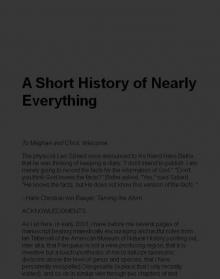 A Short History of Nearly Everything
A Short History of Nearly Everything A Walk in the Woods
A Walk in the Woods I'm a Stranger Here Myself
I'm a Stranger Here Myself The Mother Tongue
The Mother Tongue Shakespeare
Shakespeare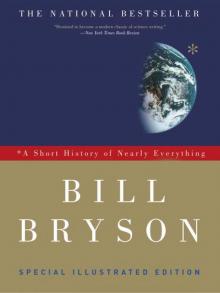 A Short History of Nearly Everything: Special Illustrated Edition
A Short History of Nearly Everything: Special Illustrated Edition The Best American Travel Writing 2016
The Best American Travel Writing 2016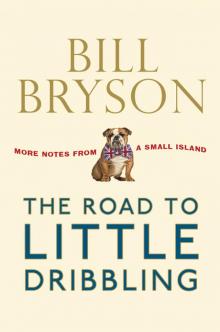 The Road to Little Dribbling
The Road to Little Dribbling The Life And Times Of The Thunderbolt Kid: A Memoir (v5.0)
The Life And Times Of The Thunderbolt Kid: A Memoir (v5.0) Made In America
Made In America Seeing Further
Seeing Further Shakespeare: The World as Stage
Shakespeare: The World as Stage The Life and Times of the Thunderbolt Kid
The Life and Times of the Thunderbolt Kid At Home
At Home Bryson's Dictionary For Writers And Editors (v5.0)
Bryson's Dictionary For Writers And Editors (v5.0)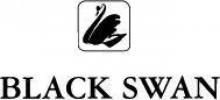 Neither Here Nor There
Neither Here Nor There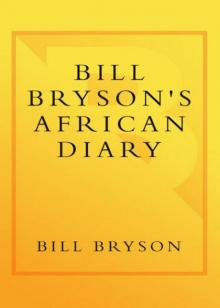 Bill Bryson's African Diary
Bill Bryson's African Diary